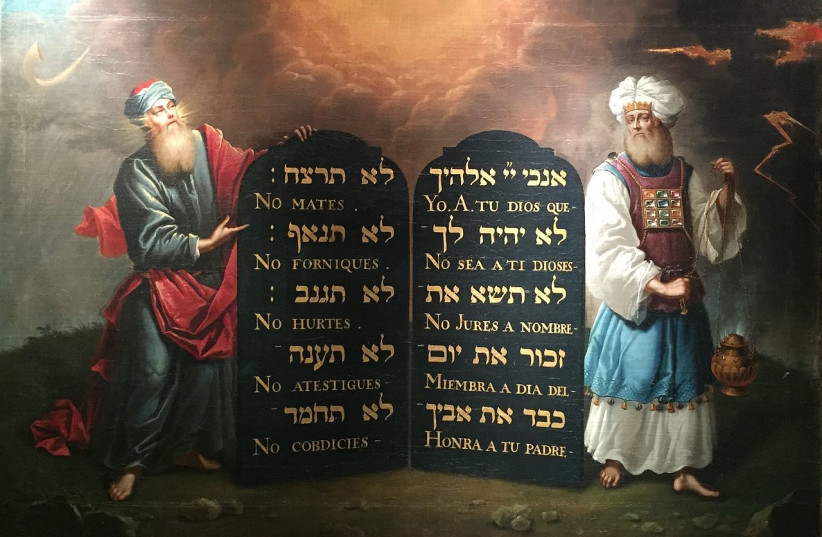"Jews read the books of Moses not just as history but as Divine command. The question to which they are an answer is not, 'What happened?' but rather, 'How then shall I live?' And it’s only with the Exodus that the life of the commands really begins."
Rabbi Jonathan Sacks
As you read this column, you will have already finished the Passover Seder, drunk four cups of wine, and are now feeling the after-effects of eating more matzah than planned. Oh, and you told the story of the Exodus from Egypt.
In the 11th chapter of the Book of Exodus, we read how the Lord tells Moses of the upcoming plague of the firstborn and the command that the Jewish people ask their Egyptian neighbors for their jewelry and clothing. In the very next chapter we read how the children of Israel, indeed left Egypt with great wealth.
Rabbi Yaakov Beasley asks, “The thrice-fold repetition of the act of taking wealth from the Egyptians should cause the reader to wonder – why was this necessary? Clearly, if even the Torah wanted to mention that the Jews were showered with gifts from their neighbors, it could have done so in passing, without placing it in the textual spotlight. In addition, the ethical question of borrowing items from others without any intention of returning them bothered many commentators. What does this story add to our understanding of the Exodus from Egypt?”
The Chizkui answers, “As they were leaving, they asked their neighbors and boarders to take their homes and property in exchange for silver and gold articles of equal value, which would be more portable. In doing so, they fulfilled the verse, “And you will save [your property from] the Egyptians.” The word “save” means that the Jewish people leaving Egypt would be able to save their property in this way, and in the verse, “And God saved the flock of your father.” (Genesis 31:9, commentary to 12:35)
Rabbi Beasley adds, “The acquisition of Egyptian gold and silver was therefore simply a mutual exchange of possessions, and no ethical questions arise.”

He continues, “Another approach is brought from the Talmud (Sanhedrin 91b). According to the Midrash, the Egyptians took the Jewish people to court in the time of Alexander the Great and sued them for the gold and silver that they “borrowed” from them during the Exodus and never returned. An outsider named Gaviah ben Pasisa volunteered to serve as the defense attorney for the Jewish people.
“He responded in front of the Greek monarch, ‘From where do you bring proof that we took the money?’ They responded, ‘From the Torah.’ He countered, ‘Then I will bring proof from the Torah, where it states that the Jewish people dwelled in Egypt for 430 years. Please give us the wages of 600,000 workers for that time period, and we shall return the gold which we took.’ The account concludes with the Egyptians requesting a three-day recess, and not returning to the court thereafter.”
Starting off with nothing
WHILE THE Jews left Egypt financially free, we don’t have the ability to ask for 430 years of back wages. How then can we achieve financial freedom? There is a common perception that only people with a lot of money are able to make money.
This is just flat out not true. If you want to achieve financial independence then you need to start investing. By saying “financial independence,” I don’t mean getting rich. Rather, I mean that you are self-sufficient, have retirement savings and don’t fret when your toilet breaks and you need come up with some money to pay a plumber to fix it. Don’t think that $25,000-$50,000 is not enough to start with. With that sum you could start an investment account.
As I have written many times, the majority of Americans between the ages of 20-35 have zero retirement savings. It’s even worse for older Americans as half of them over 53 of age have no retirement savings. It’s so important to start investing as soon as possible. If a 25-year-old with $10,000 started adding an extra $320 a month at a 7% annual compound rate of return until they turned 65, they would wind up with $1 million.
Another common mistake is thinking that it’s impossible to save while living in Israel because, according to “conventional wisdom,” it’s impossible to save on an Israeli salary.
Not true. If you make saving a priority, then you will be surprised at how much you really can save, even in Israel. We all tend to make certain lifestyle choices which impact our financial situation. Whether it’s living in a certain community or choosing to take a particular vacation, our expenses are directly impacted by these decisions. But if we make financial independence an actual priority, we can make the lifestyle changes necessary to save a couple of thousand dollars a year.
Along with mandatory pension contributions and Keren Hishtalmut (short-term tax free saving plan), putting aside just a few thousand dollars each year may not seem like a way to grow your wealth. However, taken with your starting sum, investing a few thousand dollars every year for 10-15 years could potentially leave you with a large nest egg. Before you know it, you could be financially independent.
Enjoy your Matzah. Moadim l’Simcha!
The information contained in this article reflects the opinion of the author and not necessarily the opinion of Portfolio Resources Group, Inc. or its affiliates. Aaron Katsman is the author of Retirement GPS: How to Navigate Your Way to A Secure Financial Future with Global Investing. www.gpsinvestor.com; aaron@lighthousecapital.co.il.
